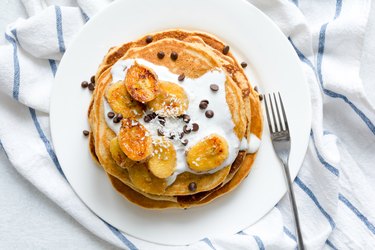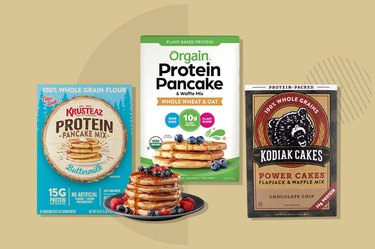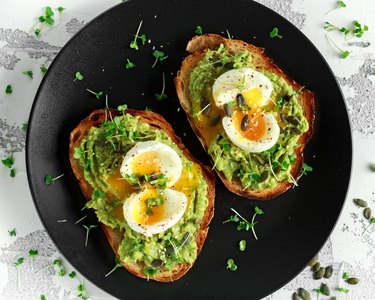
Pancakes are a go-to breakfast comfort food, but their calorie count may not fall in line with your health goals, especially if you smother them in butter and syrup before devouring. The good news is you can control pancake calories by keeping your portions small and being mindful of your toppings.
A single small plain pancake has under 100 calories, but if you add fruit or chocolate chips into the batter and butter and syrup before serving, you can easily make your breakfast closer to 350 calories. While this isn't too high as far as calories go, it's not the most nutrient-dense breakfast you can pick.
Video of the Day
Video of the Day
Tip
A regular 4-inch pancake made from a prepared mix contains 95 calories, while a 6-inch pancake has about 149 calories. A tablespoon of butter will add 102 calories and finishing it off with 1 ounce of pure maple syrup will add another 99 calories.
Basic Pancake Nutrition
A single serving of prepared pancake mix is about 1/4 cup or 36 grams. A 1/4 cup of pancake mix makes about two 4-inch pancakes.
Here's the full nutritional profile for two prepared 4-inch pancakes, according to the popular pancake brand Pearl Milling Company:
- Calories: 190
- Total fat: 6 g
- Saturated fat: 1.5 g
- Cholesterol: 60 mg
- Sodium: 640 mg
- Total carbs: 28 g
- Fiber: <1 g
- Sugar: 6 g
- Added sugar: 3 g
- Protein: 6 g
Pancake calories and basic pancake nutrition can vary widely depending on many different factors, like whether you use a prepared mix or you follow your own recipe instead. The calories will also depend on if you eat your pancakes plain or add in things like blueberries, bananas, nuts or even some extra sweetener.
If you stick to a basic pancake mix and prepare it as directed on the box (without adding toppings), a 4-inch pancake will clock in at 95 calories. If you prefer to make your pancakes a little bigger, you'll take in about 149 calories for a 6-inch pancake.
Most of the calories in a pancake made from a prepared mix come from carbohydrates. One 4-inch pancake will contribute about 14 grams of carbohydrates to your diet and the larger 6-inch pancake clocks in at slightly over 28 grams of carbs. You'll get a small amount of protein too, at just about 3 grams and 4 grams, respectively.
Calories in Syrup and Butter
What's a pancake without a heavy-handed drizzle of maple syrup and some oozing melted butter? When trying to figure out your pancake calories, it's a good idea to factor in all of the toppings you'll be using, as in most cases, you probably won't be eating it plain.
One ounce of maple syrup will add 99 calories and nearly 23 grams of sugar, and all of the calories in syrup comes from sugar. Add a tablespoon of butter and you'll also add 102 calories and 11.5 grams of fat. If you want to reduce your pancake carbs, you can use a different topping, like powdered peanut butter or monk fruit-sweetened maple syrup in place of regular maple syrup.
If you use a maple-flavored syrup that's sweetened with a keto-friendly sweetener, like monk fruit, you won't add any calories or any net carbohydrates to your pancake meal.
What's Healthier: Waffles or Pancakes?
Neither is more nutritious, but again, it boils down to the boxed mix or recipe you're using. In general, regular pancakes are made out of refined grains and should therefore be eaten in moderation, per Harvard Health Publishing.
Waffle batter generally has more sugar and more fat than pancakes because these ingredients help them crisp up better in a waffle maker. Of course, this added sugar and fat also adds calories. For example, one 40-gram pancake has 111 calories, 4.7 grams of fat and 2.9 grams of sugar while a 40-gram waffle has 147 calories, 7.4 grams of fat and 3.4 grams of sugar, per the USDA.
As with pancakes, most of those calories come from carbohydrates in the waffle.
Tips for Making Healthier Pancakes
- Make them at home: You can make healthier versions of your pancakes and waffles by opting for a homemade recipe instead of using a prepackaged waffle or pancake mix that likely has artificial ingredients and more sugar than you need.
- Skip the refined flours: There are many pancake recipes out there that use whole-grain flours and whole-food ingredients. If you can eat gluten, the Cleveland Clinic recommends using whole-wheat flour and oats in place of processed, all-purpose flour to up the fiber and protein content.
- Opt for a mix that contains protein: If you're not making your own pancakes from scratch, choose a brand with added protein for extra satiating power (like these tasty protein pancake mixes).
- Add protein powder to your batter: If you are following a recipe for homemade pancakes, consider adding a scoop of your favorite protein powder to your batter. This will add some flavor along with filling protein.
- Skip the butter and syrup: Forgoing butter and syrup will save you loads of fat and added sugars. Instead, use powdered peanut butter as a topping and zero-calorie syrup. Top it all off with fresh or microwaved frozen fruit (tastes just like compote!) for fiber and antioxidants.
Was this article helpful?
150 Characters Max
0/150
Thank you for sharing!
Thank you for your feedback!

